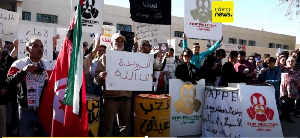Dr Kwesi Ndoum, an Economic and Management Consultant, on Tuesday described the Ghanaian economy as "primitive" saying the country lacks policies that will add value to her primary products.
"Our fundamental problem is that we are still producers and exporters of primary commodities in the 21st Century," he said on a GTV programme, "Public Concern", monitored by Ghana News Agency.
He was talking on the state of the economy and steps the new government can take to bring more sparkle into it.
He said Ghana has over relied on her natural resources without taking the necessary measures to upgrade and refine them into finished or semi-finished products.
Dr Ndoum said countries in other regions have moved from this stage to the manufacturing and, advanced to technological economies, but Ghana's economy has remained stagnant.
He recalled that since the early 1960s, succeeding governments had given political interpretations to programmes started by previous governments and never sustained development plans that were initiated.
"As soon as one government ends, everything of it becomes bad and must be thrown over board for angelic programmes by the new one."
Dr Ndoum described trade liberalisation as a theoretical policy by the developed countries to control the economies of developing nations countries while they practise a controlled economy.
For instance, strong economic powers need to negotiate with their counterparts to sell quotas agreed upon in their countries, he said, adding that Japan finds it difficult to enter the American market to trade without any hindrances.
Dr Ndoum, therefore, stressed the need for limited control on trade to help sustain local industries and their capacity to remain competitive.
He said the Central Bank should initiate measures to entice workers to save, adding that no country can develop with a low saving rate of between seven and 13 per cent.
To improve the situation, Dr Ndoum suggested a tax incentive package for monthly saving of at least 10 per cent of income.
He said with a work force of about eight million, minimum savings of 10,000 cedis monthly would generate 80 billion cedis that could be channelled through the private sector.
Dr Ndoum noted that over the past 10 years, government expenditures have been on the rise while income has been on the decline but the government managed to sustain the economy with donor inflows.
In recent times, however, donor support has not been forthcoming, thus creating huge deficits.
Dr Ndoum expressed optimism that Ghana's economy will survive when issues of the economy are addressed on a non-partisan basis.
General News of Wednesday, 17 January 2001
Source: GNA












